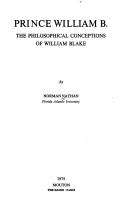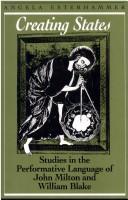| Listing 1 - 6 of 6 |
Sort by
|
Book
ISBN: 0691083827 1306992966 0691611467 0691639469 1400857643 9781400857647 9780691083827 9780691611464 Year: 1985 Publisher: Princeton, N.J. Princeton University Press
Abstract | Keywords | Export | Availability | Bookmark
 Loading...
Loading...Choose an application
- Reference Manager
- EndNote
- RefWorks (Direct export to RefWorks)
This fresh look at the social and political themes of Blake's poetry shows that he was a phenomenologist of liberation," who contested the dominant ideology of his time and who still speaks passionately to our fears and hopes.Originally published in 1985.The Princeton Legacy Library uses the latest print-on-demand technology to again make available previously out-of-print books from the distinguished backlist of Princeton University Press. These editions preserve the original texts of these important books while presenting them in durable paperback and hardcover editions. The goal of the Princeton Legacy Library is to vastly increase access to the rich scholarly heritage found in the thousands of books published by Princeton University Press since its founding in 1905.
Blake, William --- Literature and society --- Social problems in literature. --- History --- Blake, William, --- Political and social views. --- Blake, W. --- Bleĭk, Uilʹi︠a︡m, --- בליק, ויליאם --- בלייק, ויליאם --- בליק, ויליאם, --- בלייק, ויליאם, --- Blake (William). --- Blake, William, 1757-1827 - Political and social views. --- Блейк, Уильям, --- Blake, William, 1757-1827
Book
ISBN: 0691063672 1322886571 069162805X 0691648298 1400869080 9781400869084 9780691628059 Year: 1978 Publisher: Princeton, N.J.
Abstract | Keywords | Export | Availability | Bookmark
 Loading...
Loading...Choose an application
- Reference Manager
- EndNote
- RefWorks (Direct export to RefWorks)
In all of his works Blake struggled with the question of how chaos can be assimilated into imaginative order. Blake's own answer changed in the course of his poetic career. Christine Gallant contends that during the ten year period of composition of Blake's first comprehensive epic, The Four Zoas, Blake's myth expanded from a closed, static system to an open, dynamic process. She further argues that it is only through attention to the changing pattern of Jungian archetypes in the poem that one can discern this profound change. Using the depth psychology of Jung, Professor Gallant presents a comprehensive interpretation of Blake's poetry from his early "Lambeth" prophecies to his mature works, The Four Zoas, Milton, and Jerusalem. She offers a Jungian critical approach that respects the work's autonomy, but still suggests how literature is an ongoing imaginative experience in which archetypal symbols affect their literary contexts. What interests the author is the function that the very process of mythmaking had for Blake. Professor Gallant finds that the metaphysical opposition between God and Satan in Blake's earlier work gradually evolves into an interplay of these powers in the later works. The quality of Chaos changes for Blake from something unknown and feared, contrary to Order, to something intimately known and embraced.Originally published in 1979.The Princeton Legacy Library uses the latest print-on-demand technology to again make available previously out-of-print books from the distinguished backlist of Princeton University Press. These editions preserve the original texts of these important books while presenting them in durable paperback and hardcover editions. The goal of the Princeton Legacy Library is to vastly increase access to the rich scholarly heritage found in the thousands of books published by Princeton University Press since its founding in 1905.
Thematology --- English literature: authors --- Myth in literature --- Mythe dans la littérature --- Blake, William, --- Criticism and interpretation --- Myth in literature. --- Criticism and interpretation. --- Mythe dans la littérature --- Blake, W. --- Bleĭk, Uilʹi︠a︡m, --- בליק, ויליאם --- בלייק, ויליאם --- בליק, ויליאם, --- בלייק, ויליאם, --- Блейк, Уильям, --- Blake, William --- Blake, William, 1757-1827

ISBN: 9027930716 3111400255 9783111400259 9789027930712 Year: 1975 Volume: 100 Publisher: The Hague Mouton
Abstract | Keywords | Export | Availability | Bookmark
 Loading...
Loading...Choose an application
- Reference Manager
- EndNote
- RefWorks (Direct export to RefWorks)
Blake, William --- Didactic literature, English --- Philosophy in literature --- History and criticism --- Blake, William, --- Philosophy --- Philosophy in literature. --- History and criticism. --- Philosophy. --- English --- Languages & Literatures --- English Literature --- Blake, W. --- Bleĭk, Uilʹi︠a︡m, --- בליק, ויליאם, --- בלייק, ויליאם, --- Блейк, Уильям, --- Blake, William, 1757-1827 --- Philosophie. --- Sake, William. --- LANGUAGE ARTS & DISCIPLINES / Linguistics / General. --- Didactic literature, English - History and criticism --- Blake, William, - 1757-1827 - Philosophy --- Blake, William, - 1757-1827
Book
ISBN: 1283733501 1611483956 9781611483949 1611483948 9781611483956 9781283733502 Year: 2012 Publisher: Lanham, Md. : Bucknell University Press,
Abstract | Keywords | Export | Availability | Bookmark
 Loading...
Loading...Choose an application
- Reference Manager
- EndNote
- RefWorks (Direct export to RefWorks)
Revealing Bodies considers three thinkers not often read together in order to ask a question with continued relevance in the present: how is it that we claim to know the body? Reading their work in relation to their contemporary anatomical discourse as well as our own contemporary anatomical spectacle, the book explores a question with wide-ranging stakes both for those with specialized interest in eighteenth and nineteenth-century culture and with a broader interest in bodily representation.
Human body in literature. --- Human body (Philosophy) --- Blake, William, --- Burke, Edmund, --- Tighe, Mary, --- Body, Human (Philosophy) --- Body, Human, in literature --- Human figure in literature --- Tighe, Mary Blanchford, --- Tighe, Henry, --- Berḳ, Edmand, --- Berk, Ėdmund, --- Bŏŏkʻŭ, Edŭmŏndŭ, --- Late noble writer, --- ברק, אדמנד --- Blake, W. --- Bleĭk, Uilʹi︠a︡m, --- בליק, ויליאם --- בלייק, ויליאם --- בליק, ויליאם, --- בלייק, ויליאם, --- Philosophy --- Human body (Philosophy). --- Human body. --- Literature. --- Блейк, Уильям, --- Blake, William --- Blake, William, 1757-1827

ISBN: 1282003003 9786612003004 1442673575 0802005624 1442614943 9781442673571 9781282003002 9780802005625 1487596758 Year: 1994 Publisher: Toronto
Abstract | Keywords | Export | Availability | Bookmark
 Loading...
Loading...Choose an application
- Reference Manager
- EndNote
- RefWorks (Direct export to RefWorks)
Analysing texts such as The Reason of Church Government, Paradise Lost, The Marriage of Heaven and Hell, and Jerusalem, Esterhammer traces the parallel evolution of Milton and Blake from writers of political and anti-prelatical tracts to poets who, having failed in their attempts to alter historical circumstances through a direct address to their contemporaries, reaffirm their faith in individual visionary consciousness and the creative word - while continuing to use the forms of a socially or politically performative language. Esterhammer distinguishes between the 'socio-political performative, ' the speech act which is defined by a societal context and derives power from institutional authority, and the 'phenomenological performative, ' language which is invested with the power to posit or create because of the individual will and consciousness of the speaker. Angela Esterhammer proposes a new way of understanding the relationship between Milton and Blake, while at the same time evaluating the role of speech-act philosophy in the reading of visionary poetry and Romantic literature. Although the concept of the performative has influenced literary theory in numerous ways, this book represents one of the first full-length studies of performative language in literary texts. Creating States examines the visionary poetry of John Milton and William Blake, using a critical approach based on principles of speech-act theory as articulated by J.L. Austin, John Searle, and Emile Benveniste.
LITERARY CRITICISM --- European / English, Irish, Scottish, Welsh --- English language --- English poetry --- Visions in literature --- Performative (Philosophy) --- Speech acts (Linguistics) --- English Literature --- English --- Languages & Literatures --- Style --- History and criticism --- Versification --- Visions in literature. --- Style. --- History and criticism. --- Versification. --- Milton, John, --- Blake, William, --- Language. --- Illocutionary acts (Linguistics) --- Speech act theory (Linguistics) --- Speech events (Linguistics) --- Performativity (Philosophy) --- Metrics and rhythmics --- Prosody --- Blake, W. --- Bleĭk, Uilʹi︠a︡m, --- בליק, ויליאם, --- בלייק, ויליאם, --- Language and languages --- Linguistics --- Speech --- Methodology --- Philosophy --- Semantics (Philosophy) --- Milton, John --- Language --- Blake, William --- Style [Literary ] --- Блейк, Уильям, --- Milṭan, Jān, --- Milʹton, Dzhon, --- Милтон, Джон, --- Miltūn, Zhūn, --- Miltonus, Joannes, --- J. M. --- M., J. --- Milʹton, Īoann, --- Milton, Gioanni, --- Milton, Giovanni, --- מילטאן, יאהאן --- מילטאן, יוחנן --- מילטון, ג׳והן --- מלטן, יוחנן --- Blake, William, 1757-1827 --- Germanic languages
Book
ISBN: 9781441135599 9781441114525 1441135596 1441114521 1441178066 1474211267 128257681X 9786612576812 9781474211260 6612576812 9781441178060 9781441136770 1441136770 Year: 2010 Volume: *10 Publisher: London New York Continuum
Abstract | Keywords | Export | Availability | Bookmark
 Loading...
Loading...Choose an application
- Reference Manager
- EndNote
- RefWorks (Direct export to RefWorks)
Apocalyptic nightmares that humanly-created intelligences will one day rise up against their creators haunt the western creative imagination. However, these narratives find their initial expression not in the widely disseminated Frankenstein story but in William Blake's early mythological works. This book looks at why we persistently fear our own creations by examining Blake's illuminated books of the 1790's through the lens of Kierkegaard's theories of personality and of anxiety. It offers a close examination of Kierkegaard's and Blake's similar, and to an extent shared, historical milieux as
Literature --- Anxiety in literature. --- Littérature --- Angoisse dans la littérature --- Philosophy. --- Philosophie --- Blake, William, --- Kierkegaard, Sren, --- Criticism and interpretation. --- Blake, William, --1757-1827 --Criticism and interpretation. --- Creation in literature. --- Kierkegaard, Søren, --1813-1855. --- Literature --Philosophy. --- Creation in literature --- Anxiety in literature --- English --- English Literature --- Languages & Literatures --- Philosophy --- Kierkegaard, Søren, --- Littérature --- Angoisse dans la littérature --- Literature and philosophy --- Philosophy and literature --- Theory --- Anti-Climacus, --- Bogbinder, Hilarius, --- Chʻi-kʻo-kuo, --- Climacus, Johannes, --- Constantius, Constantin, --- Eremita, Victor, --- Haufniensis, Vigilius, --- Johannes, Climacus, --- Johannes de Silentio, --- Kʹerkegor, Seren, --- Kierkegaard, S. --- Kierkegaard, Severino, --- Kierkegaard, Søren Aabye, --- Kierkegaard, Søren --- K'i︠e︡rkegor, Sʹoren, --- Kīrkajūrd, Sūrīn, --- Kirkegaard, Soeren, --- Kirkegor, Seren, --- Ḳirḳegor, Sern, --- Kirkegors, Sērens, --- Kirukegōru, Søren, --- Kjerkegor, Seren, --- Kʻo-erh-kʻai-ko-erh, --- Notabene, Nicolaus, --- Silentio, Johannes de, --- Sūrīn Kīrkajūrd, --- Victor, Eremita, --- Vigilius, Haufniensis, --- קירקגור, סרן --- קירקגור, סורן --- קירקגור, סירן --- קירקגור, סירן, --- קירקגורד, סרן, --- 克尓凯郭尓, --- Blake, W. --- Bleĭk, Uilʹi︠a︡m, --- בליק, ויליאם --- בלייק, ויליאם --- בליק, ויליאם, --- בלייק, ויליאם, --- Anti-climacus --- H. H. --- Блейк, Уильям, --- Blake, William --- Blake, William, 1757-1827
| Listing 1 - 6 of 6 |
Sort by
|

 Search
Search Feedback
Feedback About UniCat
About UniCat  Help
Help News
News